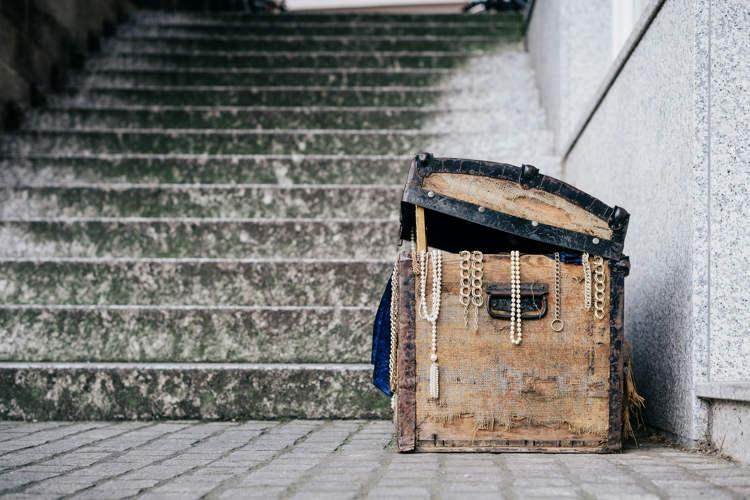Calling Albert Podell ‘well traveled’ would be an understatement. 78-year-old Podell, a former Playboy editor, can truly say that he’s seen it all, after spending half a century visiting every country in the world. He’s encountered pretty much everything on his travels, right from guerillas in Yemen, to flying-crab attacks in Algeria, and police interrogations in Cuba. He has chased water buffaloes, broken his bones, and eaten all kinds of weird stuff. He’s been robbed, arrested, and almost lynched!
Podell was bitten by the travel bug at a very young age. “Aged six, I started to collect postage stamps, and where the other kids specialised in certain countries, I wanted a stamp from every country in the world,” he told Daily Mail. “Getting a passport stamp from every one may have been inspired by that.”
“Those little coloured bits of perforated paper also instilled in me a fascination with travel because I wanted to see the lands where all the objects, people, and places depicted on those stamps came from.” So he resolved early on that “there was more to life than hanging around in one city forever.”
Photo: Albert Podell
As a young man, Podell took off on the next adventure whenever he got time off work. At age 28, he led an expedition around the world, setting the record for the longest automobile journey ever made around the earth. But as he grew older, he realised that he wasn’t satisfied with traveling in bits and pieces.
“As I moved past middle age, I still wanted to do one grand and glorious travel venture, to go out with a bang rather than a whimper, and, after I realized that I had been to 90 nations, I decided that I just might be able to visit every one of the 196 countries during my allotted years,” he said.
Traveling has not exactly been smooth-sailing all the time, but Podell has enjoyed every second of it. With an accommodation budget of about $10 per night, he has spent several nights in his sleeping bag, “at border posts, roadsides, jungles, glaciers, airport floors, and in hostels, tents, trailers, trees, teepees, campers, cars, caravansaries, desert dugouts, and flea-bag motels alternately sweating and freezing; dodging dengue- fever mosquitoes by day and malarial ones by night.”
He’s also been through some truly terrifying moments, like the time when he was unable to provide proof of not being Jewish to the Egyptian government, or the time he was unable to prove that he was not CIA to the Cuban secret police. He was also thrown in jail in Baghdad, when a conman pretended that Podell had hit him with a car. Some of his hair-raising moments include being stranded on Kiribati, robbed in Algiers and the Khyber Pass, nearly lynched in East Pakistan where he was mistaken for an Indian spy, and almost drowned in Costa Rica.
Understandably, he’s eaten some odd food during the course of his travels. “Among the most memorable was an anteater Steve (his friend) and I found recently run over on a road in Panama,” Podell said. “Not wanting to waste a good source of protein, we chopped it up, added salt and pepper, wished we had a box of Roadkill Helper, roasted it over a campfire, and it tasted… awful, like a burger marinated in formic acid.”
Photo: Albert Podell
Rats, he says, are unexpectedly tasty, “especially the big boys eaten in Africa, where they’re called ‘grass cutters’. The locals skin the rodents, split them down the middle, spread them out flat, and roast or grill them. Each tastes exactly like what it ate. If it lived in a cane field, it tastes like sugar.”
“Unfortunately, the elephant dung beetle I ate in Kenya smelled exactly like what it ate, but I overcame this olfactory impediment with a liberal application of insect repellant under my nose,” he joked.
Some of the other strange foods he’s eaten include iguana in Central America, fish lips and organ meats boiled in blood in China, possum pie in the Caribbean, and crocodile in Australia. “I’ll eat almost anything except endangered species,” he told National Geographic News. “I ate the brain of a live monkey in Hong Kong. I ate old camel meat, which just slithers around in your mouth and coats it with grease.”
He’s been on some offbeat modes of transport as well – ancient airplanes, overloaded ferries, broken-down bush taxis, pole-pushed canoes, cotton trucks, camels, donkeys, rickshaws, tuk-tuks and more. “In short, almost anything that transports people, except an ambulance, thank God,” he joked.
Photo: Albert Podell
Podell has strict criteria as to what counts as a ‘country’ while traveling. He obviously doesn’t cheat by counting places where he’s changed planes. According to his standards, for a country to be considered ‘visited’ three requirements have to be met: “it has to be a recognized country at the time you go there,” “you must have a visa or enter legitimately,” and, “you must get a passport stamp.”
He also has a few flexible rules: “you should at least go to the capital, stay at least 24 hours, and if possible cross the country in one direction.”
Over the years, he has also developed a unique system for rating countries, called the PPPR (the Podell Potty Paper Rating System). “You can spend hours looking at these studies that are issued by the World Bank and the IMF. But I found the surest way to know where a country ranks economically and socially is to go to a public bathroom and check the toilet paper,” he said.
“I have seven rankings, starting with the best, which is soft white. From soft white it goes down to hard white; hard brown; purple, green, and other colors; to torn-up newspaper; to no paper at all, just a little bucket of water. The lowest ranking, which is a seven, is when there are no public toilets. The only place I have tentatively given a number seven ranking to is my hometown of New York City. In the entire city, I’m only aware of three public toilets.”
Photo: Albert Podell
Although he’s been everywhere, Podell named the US as his favorite country in the world. “We have some of the most spectacular scenery in the world: the redwoods, Glacier National Park, Mount Rainier, the foliage trails of New England,” he said. “We are a heterogeneous society. In New York, you can see people of every race, creed, and color in the world, all getting along.”
“But if I had to pick countries, I’d go with Nepal and Switzerland for scenery,” he added. “For food, I would go with Vietnam, Thailand, and France. For culture I would go with France, England, Spain, and Egypt.”
One of his biggest learnings from all his travels has been that people around the world are the same. “With the exception of the few truly weird countries (like North Korea and those in the midst of famine or war) people around the world are pretty much the same in terms of their love for their families and children, their desire to be happy, and their hope to live in peace and have a better life,” he said.
“The main differences I observed were that people in the very poor countries were far more able to get along on less than citizens of the rich countries ever could.”
It would have been a shame not to share all his experiences with the rest of the world, so Albert Podell put all the best moments of his epic travels into a book called Around the World in 50 Years.
Sources: Nat Geo News, Daily Mail










